2022-2023学年高中英语外刊精读课件(17张ppt)
文档属性
| 名称 | 2022-2023学年高中英语外刊精读课件(17张ppt) | 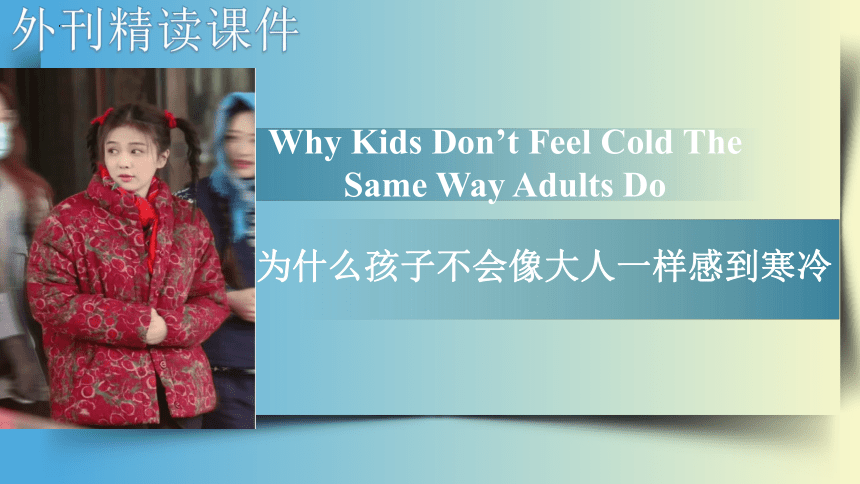 | |
| 格式 | pptx | ||
| 文件大小 | 1.2MB | ||
| 资源类型 | 教案 | ||
| 版本资源 | 通用版 | ||
| 科目 | 英语 | ||
| 更新时间 | 2023-01-13 21:44:14 | ||
图片预览

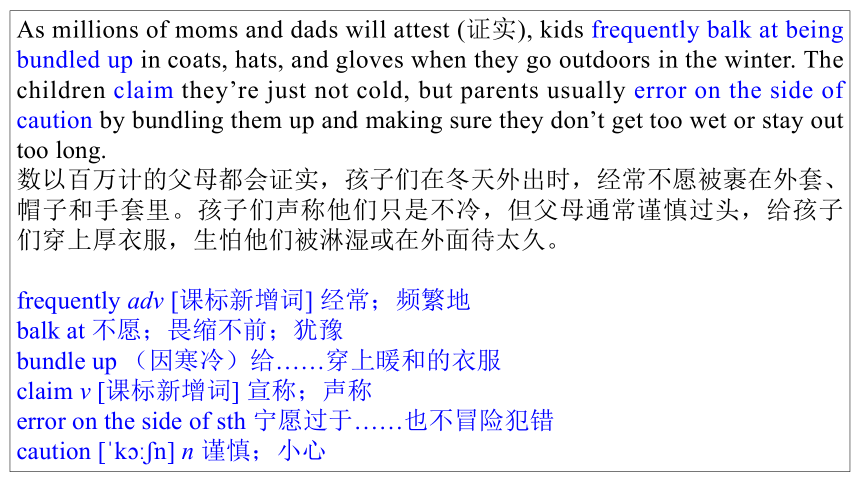
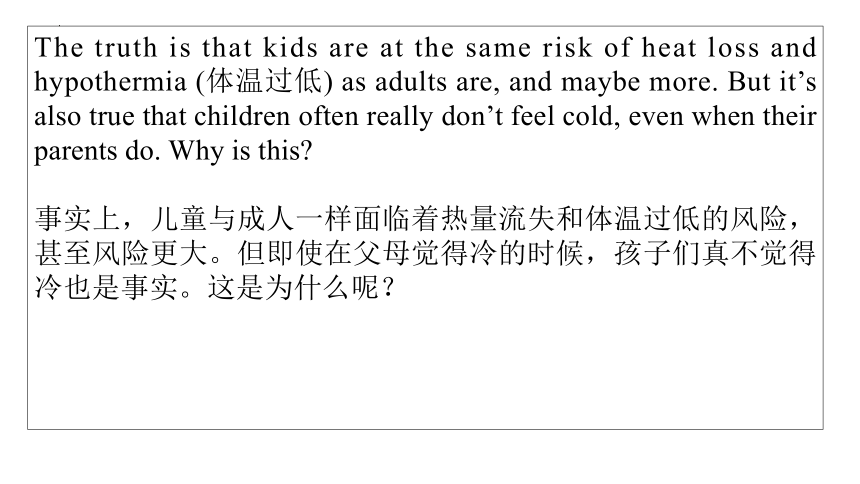
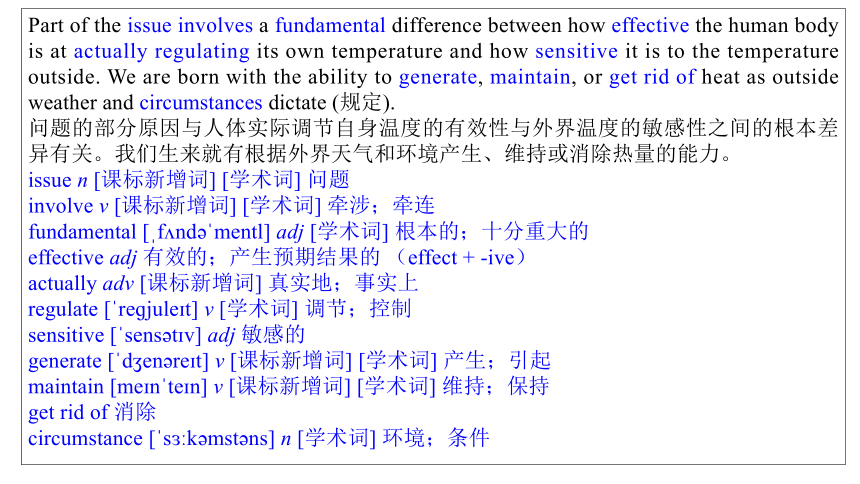
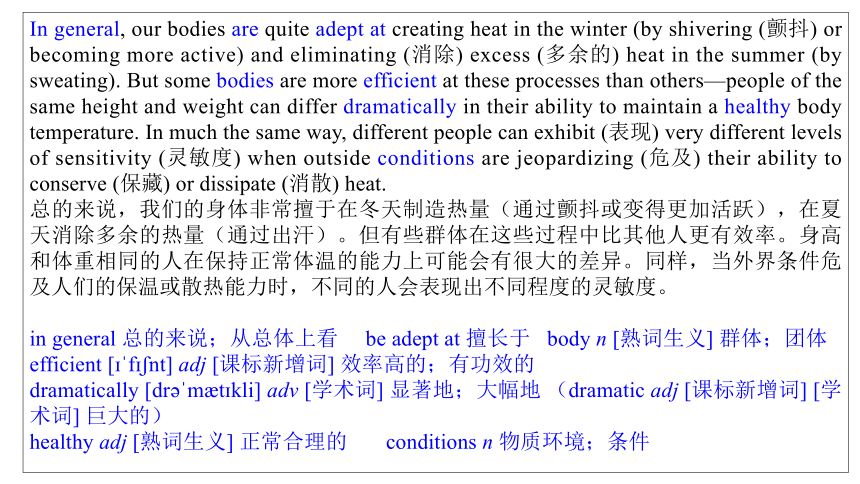
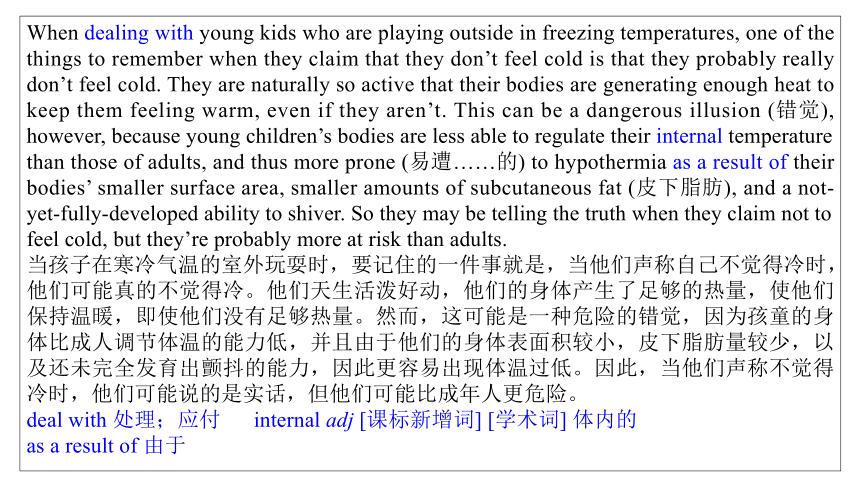
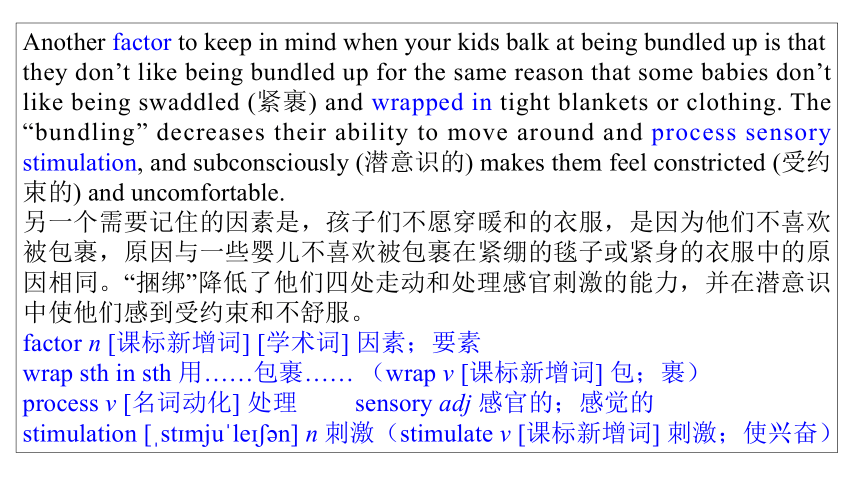
文档简介
(共17张PPT)
外刊精读课件
Why Kids Don’t Feel Cold The Same Way Adults Do
为什么孩子不会像大人一样感到寒冷
As millions of moms and dads will attest (证实), kids frequently balk at being bundled up in coats, hats, and gloves when they go outdoors in the winter. The children claim they’re just not cold, but parents usually error on the side of caution by bundling them up and making sure they don’t get too wet or stay out too long.
数以百万计的父母都会证实,孩子们在冬天外出时,经常不愿被裹在外套、帽子和手套里。孩子们声称他们只是不冷,但父母通常谨慎过头,给孩子们穿上厚衣服,生怕他们被淋湿或在外面待太久。
frequently adv [课标新增词] 经常;频繁地
balk at 不愿;畏缩不前;犹豫
bundle up (因寒冷)给……穿上暖和的衣服
claim v [课标新增词] 宣称;声称
error on the side of sth 宁愿过于……也不冒险犯错
caution [ k n] n 谨慎;小心
The truth is that kids are at the same risk of heat loss and hypothermia (体温过低) as adults are, and maybe more. But it’s also true that children often really don’t feel cold, even when their parents do. Why is this
事实上,儿童与成人一样面临着热量流失和体温过低的风险,甚至风险更大。但即使在父母觉得冷的时候,孩子们真不觉得冷也是事实。这是为什么呢?
Part of the issue involves a fundamental difference between how effective the human body is at actually regulating its own temperature and how sensitive it is to the temperature outside. We are born with the ability to generate, maintain, or get rid of heat as outside weather and circumstances dictate (规定).
问题的部分原因与人体实际调节自身温度的有效性与外界温度的敏感性之间的根本差异有关。我们生来就有根据外界天气和环境产生、维持或消除热量的能力。
issue n [课标新增词] [学术词] 问题
involve v [课标新增词] [学术词] 牵涉;牵连
fundamental [ f nd mentl] adj [学术词] 根本的;十分重大的
effective adj 有效的;产生预期结果的 (effect + -ive)
actually adv [课标新增词] 真实地;事实上
regulate [ reɡjule t] v [学术词] 调节;控制
sensitive [ sens t v] adj 敏感的
generate [ d en re t] v [课标新增词] [学术词] 产生;引起
maintain [me n te n] v [课标新增词] [学术词] 维持;保持
get rid of 消除
circumstance [ s k mst ns] n [学术词] 环境;条件
In general, our bodies are quite adept at creating heat in the winter (by shivering (颤抖) or becoming more active) and eliminating (消除) excess (多余的) heat in the summer (by sweating). But some bodies are more efficient at these processes than others—people of the same height and weight can differ dramatically in their ability to maintain a healthy body temperature. In much the same way, different people can exhibit (表现) very different levels of sensitivity (灵敏度) when outside conditions are jeopardizing (危及) their ability to conserve (保藏) or dissipate (消散) heat.
总的来说,我们的身体非常擅于在冬天制造热量(通过颤抖或变得更加活跃),在夏天消除多余的热量(通过出汗)。但有些群体在这些过程中比其他人更有效率。身高和体重相同的人在保持正常体温的能力上可能会有很大的差异。同样,当外界条件危及人们的保温或散热能力时,不同的人会表现出不同程度的灵敏度。
in general 总的来说;从总体上看 be adept at 擅长于 body n [熟词生义] 群体;团体
efficient [ f nt] adj [课标新增词] 效率高的;有功效的
dramatically [dr m t kli] adv [学术词] 显著地;大幅地 (dramatic adj [课标新增词] [学术词] 巨大的)
healthy adj [熟词生义] 正常合理的 conditions n 物质环境;条件
When dealing with young kids who are playing outside in freezing temperatures, one of the things to remember when they claim that they don’t feel cold is that they probably really don’t feel cold. They are naturally so active that their bodies are generating enough heat to keep them feeling warm, even if they aren’t. This can be a dangerous illusion (错觉), however, because young children’s bodies are less able to regulate their internal temperature than those of adults, and thus more prone (易遭……的) to hypothermia as a result of their bodies’ smaller surface area, smaller amounts of subcutaneous fat (皮下脂肪), and a not-yet-fully-developed ability to shiver. So they may be telling the truth when they claim not to feel cold, but they’re probably more at risk than adults.
当孩子在寒冷气温的室外玩耍时,要记住的一件事就是,当他们声称自己不觉得冷时,他们可能真的不觉得冷。他们天生活泼好动,他们的身体产生了足够的热量,使他们保持温暖,即使他们没有足够热量。然而,这可能是一种危险的错觉,因为孩童的身体比成人调节体温的能力低,并且由于他们的身体表面积较小,皮下脂肪量较少,以及还未完全发育出颤抖的能力,因此更容易出现体温过低。因此,当他们声称不觉得冷时,他们可能说的是实话,但他们可能比成年人更危险。
deal with 处理;应付 internal adj [课标新增词] [学术词] 体内的
as a result of 由于
Another factor to keep in mind when your kids balk at being bundled up is that they don’t like being bundled up for the same reason that some babies don’t like being swaddled (紧裹) and wrapped in tight blankets or clothing. The “bundling” decreases their ability to move around and process sensory stimulation, and subconsciously (潜意识的) makes them feel constricted (受约束的) and uncomfortable.
另一个需要记住的因素是,孩子们不愿穿暖和的衣服,是因为他们不喜欢被包裹,原因与一些婴儿不喜欢被包裹在紧绷的毯子或紧身的衣服中的原因相同。“捆绑”降低了他们四处走动和处理感官刺激的能力,并在潜意识中使他们感到受约束和不舒服。
factor n [课标新增词] [学术词] 因素;要素
wrap sth in sth 用……包裹…… (wrap v [课标新增词] 包;裹)
process v [名词动化] 处理 sensory adj 感官的;感觉的
stimulation [ st mju le n] n 刺激(stimulate v [课标新增词] 刺激;使兴奋)
Also, as kids grow older and become more socialized, they may not feel that wearing a coat and hat and gloves is “cool,” so they may resist being forced to wear clothing that makes them stand out and not “fit in” with how other kids are dressing.
此外,随着孩子们年龄的增长和社会化程度的提高,他们可能不会觉得穿外套、戴帽子和手套是件很酷的事,因此他们可能会抗拒被迫穿那些让他们引人注目的衣服,而穿着和其他孩子一样的“合群”的穿着方式。
resist doing sth 拒绝做某事
stand out 引人注目;显而易见
fit in 被他人接受;相处融洽
Still, as a general rule, it’s better to make sure that your kids are dressed warmly in extreme cold to prevent issues of hypothermia and frostbite (冻伤). Wearing that coat, hat, and gloves will not protect them from catching colds and the flu — that’s an “old parents’ tale” because these diseases are spread by microorganisms (微生物) — but it will protect them against the physical dangers posed by extreme cold.
不过,一般来说,最好确保你的孩子在极寒时穿着暖和,以防止体温过低和冻伤。穿上外套、戴上帽子和手套会防止他们感染感冒和流感是“无稽之谈”,因为这些疾病是由微生物传播的,但它可以保护他们免受极端寒冷带来的身体危险。
as a general rule 一般来说
physical adj 身体的;躯体的
pose v [学术词] [熟词生义] 造成;引起;产生
extreme adj 极端的 (extremely adv [课标新增词] 极端;极其)
But here is another interesting side of the story. Scandinavian (斯堪的纳维亚人) parents (from Sweden (瑞典) and Norway (挪威), where winter temperatures are often extreme) maintain centuries-old traditions of allowing their newborns and young infants (婴儿) to nap (打盹) outside while sleeping in their strollers (轻便婴儿车). It’s not unusual to walk past a child care center and see rows of strollers lined up outside, the babies in them wrapped in blankets and sleeping soundly. The parents — doing what their parents and grandparents before them did — feel that exposure to fresh air at any temperature is better than being cooped up inside.
但还有一个有趣的故事。斯堪的纳维亚父母(来自瑞典和挪威,那里的冬季气温通常很低)保持着数百年的传统,允许新生儿和婴儿在室外的婴儿车里小睡。走过一家儿童护理中心,看到一排排婴儿车排在外面,裹着毯子的婴儿睡得很香,这并不稀奇。父母和他们之前的父母和祖父母一样,觉得在任何温度下接触新鲜空气都比被关在室内要好。
side of the story 对某事的说法
line up (使)排成行 soundly adv (酣)睡;(睡得)沉
exposure [ k sp (r)] n [课标新增词] [学术词] 暴露
be cooped up 被关在狭小地方里
And the cold / flu / disease statistics in Scandinavia support this belief because the Scandinavian “outside nappers” have fewer colds than American infants do. But it’s also important to realize that these naps are always supervised (监督) by adults, the babies are wrapped warmly, and the adults bring them back inside the moment outside temperatures dip below 15 degrees Fahrenheit (华氏的). Also, when the kids get bigger, their parents dress them just as warmly when they go out to play as American parents do and probably endure (忍耐) just as many protestations (声明) of “But Mom… I’m not cold.” as we do.
斯堪的纳维亚半岛的感冒 / 流感 / 疾病统计数据支持了这一观点,因为斯堪的那维亚“户外小睡者”比美国婴儿少感冒。但同样重要的是,要认识到,这些小睡总是由成年人监护,婴儿被温暖地包裹着,当室外温度降至15华氏度以下时,成年人会将他们带回室内。此外,当孩子们长大后,他们的父母在他们外出玩耍时给他们穿得很温暖,就像美国父母做的那样,可能也会像我们一样忍受“但妈妈……我不冷”的抗议。
statistic n [学术词] 统计数据
dip v [熟词生义] 下降;下沉
So the general consensus (共识) in the global healthcare community seems to be that you should ignore these protests from your kids when they don’t want to wear appropriate clothing in the cold, and make sure they do it anyway. The dangers of developing frostbite and hypothermia far outweigh the dangers of not appearing “cool” in front of their playmates.
因此,全球医疗界的普遍共识似乎是,当你的孩子不想在寒冷中穿合适的衣服时,你应该忽视他们的抗议,并确保他们无论如何都要这样做。冻伤和体温过低的危险远远超过了在玩伴面前不“酷”的危险。
community [k mju n ti] n [课标新增词] [学术词] [熟词生义] 界;团体
protest [ pr test] n [课标新增词] 抗议;反对
appropriate [ pr pri t] adj 合适的;恰当的
outweigh v 超过 (out + weigh)
课后练习:
翻译下列短语:
不愿意做某事
在外面待着
冒着......的风险
与生俱来的
消除
擅长
be balk at doing
stay out
at the risk of doing
be born with
get rid of
be adept at
课后练习:
翻译下列短语:
在......有效率
在......不同
同样
危及能力
易遭受.......的
老实说
be efficient in sth
differ in sth
in much the same way
jeopardize the ability
be prone to
tell the truth
课后练习:
翻译下列短语:
记住某事
用......包裹......
处理感官刺激
拒绝做某事
引人注目
相处融洽
bear sth in mind
wrap sth in sth
process sensory stimulation
resist doing sth
stand out
fit in
课后练习:
翻译下列短语:
一般来说
穿着
保护......免受......
由......传播
由......引起
对......的说法
in general
be dressed in
protect ... from ...
be spread by...
be posed by...
side of the story
课后练习:
翻译下列短语:
允许某人做某事
使得......排成行
由某人监督
A远远超过B
allow sb to do sth
line up
be supervised by sb
A far outweigh B
外刊精读课件
Why Kids Don’t Feel Cold The Same Way Adults Do
为什么孩子不会像大人一样感到寒冷
As millions of moms and dads will attest (证实), kids frequently balk at being bundled up in coats, hats, and gloves when they go outdoors in the winter. The children claim they’re just not cold, but parents usually error on the side of caution by bundling them up and making sure they don’t get too wet or stay out too long.
数以百万计的父母都会证实,孩子们在冬天外出时,经常不愿被裹在外套、帽子和手套里。孩子们声称他们只是不冷,但父母通常谨慎过头,给孩子们穿上厚衣服,生怕他们被淋湿或在外面待太久。
frequently adv [课标新增词] 经常;频繁地
balk at 不愿;畏缩不前;犹豫
bundle up (因寒冷)给……穿上暖和的衣服
claim v [课标新增词] 宣称;声称
error on the side of sth 宁愿过于……也不冒险犯错
caution [ k n] n 谨慎;小心
The truth is that kids are at the same risk of heat loss and hypothermia (体温过低) as adults are, and maybe more. But it’s also true that children often really don’t feel cold, even when their parents do. Why is this
事实上,儿童与成人一样面临着热量流失和体温过低的风险,甚至风险更大。但即使在父母觉得冷的时候,孩子们真不觉得冷也是事实。这是为什么呢?
Part of the issue involves a fundamental difference between how effective the human body is at actually regulating its own temperature and how sensitive it is to the temperature outside. We are born with the ability to generate, maintain, or get rid of heat as outside weather and circumstances dictate (规定).
问题的部分原因与人体实际调节自身温度的有效性与外界温度的敏感性之间的根本差异有关。我们生来就有根据外界天气和环境产生、维持或消除热量的能力。
issue n [课标新增词] [学术词] 问题
involve v [课标新增词] [学术词] 牵涉;牵连
fundamental [ f nd mentl] adj [学术词] 根本的;十分重大的
effective adj 有效的;产生预期结果的 (effect + -ive)
actually adv [课标新增词] 真实地;事实上
regulate [ reɡjule t] v [学术词] 调节;控制
sensitive [ sens t v] adj 敏感的
generate [ d en re t] v [课标新增词] [学术词] 产生;引起
maintain [me n te n] v [课标新增词] [学术词] 维持;保持
get rid of 消除
circumstance [ s k mst ns] n [学术词] 环境;条件
In general, our bodies are quite adept at creating heat in the winter (by shivering (颤抖) or becoming more active) and eliminating (消除) excess (多余的) heat in the summer (by sweating). But some bodies are more efficient at these processes than others—people of the same height and weight can differ dramatically in their ability to maintain a healthy body temperature. In much the same way, different people can exhibit (表现) very different levels of sensitivity (灵敏度) when outside conditions are jeopardizing (危及) their ability to conserve (保藏) or dissipate (消散) heat.
总的来说,我们的身体非常擅于在冬天制造热量(通过颤抖或变得更加活跃),在夏天消除多余的热量(通过出汗)。但有些群体在这些过程中比其他人更有效率。身高和体重相同的人在保持正常体温的能力上可能会有很大的差异。同样,当外界条件危及人们的保温或散热能力时,不同的人会表现出不同程度的灵敏度。
in general 总的来说;从总体上看 be adept at 擅长于 body n [熟词生义] 群体;团体
efficient [ f nt] adj [课标新增词] 效率高的;有功效的
dramatically [dr m t kli] adv [学术词] 显著地;大幅地 (dramatic adj [课标新增词] [学术词] 巨大的)
healthy adj [熟词生义] 正常合理的 conditions n 物质环境;条件
When dealing with young kids who are playing outside in freezing temperatures, one of the things to remember when they claim that they don’t feel cold is that they probably really don’t feel cold. They are naturally so active that their bodies are generating enough heat to keep them feeling warm, even if they aren’t. This can be a dangerous illusion (错觉), however, because young children’s bodies are less able to regulate their internal temperature than those of adults, and thus more prone (易遭……的) to hypothermia as a result of their bodies’ smaller surface area, smaller amounts of subcutaneous fat (皮下脂肪), and a not-yet-fully-developed ability to shiver. So they may be telling the truth when they claim not to feel cold, but they’re probably more at risk than adults.
当孩子在寒冷气温的室外玩耍时,要记住的一件事就是,当他们声称自己不觉得冷时,他们可能真的不觉得冷。他们天生活泼好动,他们的身体产生了足够的热量,使他们保持温暖,即使他们没有足够热量。然而,这可能是一种危险的错觉,因为孩童的身体比成人调节体温的能力低,并且由于他们的身体表面积较小,皮下脂肪量较少,以及还未完全发育出颤抖的能力,因此更容易出现体温过低。因此,当他们声称不觉得冷时,他们可能说的是实话,但他们可能比成年人更危险。
deal with 处理;应付 internal adj [课标新增词] [学术词] 体内的
as a result of 由于
Another factor to keep in mind when your kids balk at being bundled up is that they don’t like being bundled up for the same reason that some babies don’t like being swaddled (紧裹) and wrapped in tight blankets or clothing. The “bundling” decreases their ability to move around and process sensory stimulation, and subconsciously (潜意识的) makes them feel constricted (受约束的) and uncomfortable.
另一个需要记住的因素是,孩子们不愿穿暖和的衣服,是因为他们不喜欢被包裹,原因与一些婴儿不喜欢被包裹在紧绷的毯子或紧身的衣服中的原因相同。“捆绑”降低了他们四处走动和处理感官刺激的能力,并在潜意识中使他们感到受约束和不舒服。
factor n [课标新增词] [学术词] 因素;要素
wrap sth in sth 用……包裹…… (wrap v [课标新增词] 包;裹)
process v [名词动化] 处理 sensory adj 感官的;感觉的
stimulation [ st mju le n] n 刺激(stimulate v [课标新增词] 刺激;使兴奋)
Also, as kids grow older and become more socialized, they may not feel that wearing a coat and hat and gloves is “cool,” so they may resist being forced to wear clothing that makes them stand out and not “fit in” with how other kids are dressing.
此外,随着孩子们年龄的增长和社会化程度的提高,他们可能不会觉得穿外套、戴帽子和手套是件很酷的事,因此他们可能会抗拒被迫穿那些让他们引人注目的衣服,而穿着和其他孩子一样的“合群”的穿着方式。
resist doing sth 拒绝做某事
stand out 引人注目;显而易见
fit in 被他人接受;相处融洽
Still, as a general rule, it’s better to make sure that your kids are dressed warmly in extreme cold to prevent issues of hypothermia and frostbite (冻伤). Wearing that coat, hat, and gloves will not protect them from catching colds and the flu — that’s an “old parents’ tale” because these diseases are spread by microorganisms (微生物) — but it will protect them against the physical dangers posed by extreme cold.
不过,一般来说,最好确保你的孩子在极寒时穿着暖和,以防止体温过低和冻伤。穿上外套、戴上帽子和手套会防止他们感染感冒和流感是“无稽之谈”,因为这些疾病是由微生物传播的,但它可以保护他们免受极端寒冷带来的身体危险。
as a general rule 一般来说
physical adj 身体的;躯体的
pose v [学术词] [熟词生义] 造成;引起;产生
extreme adj 极端的 (extremely adv [课标新增词] 极端;极其)
But here is another interesting side of the story. Scandinavian (斯堪的纳维亚人) parents (from Sweden (瑞典) and Norway (挪威), where winter temperatures are often extreme) maintain centuries-old traditions of allowing their newborns and young infants (婴儿) to nap (打盹) outside while sleeping in their strollers (轻便婴儿车). It’s not unusual to walk past a child care center and see rows of strollers lined up outside, the babies in them wrapped in blankets and sleeping soundly. The parents — doing what their parents and grandparents before them did — feel that exposure to fresh air at any temperature is better than being cooped up inside.
但还有一个有趣的故事。斯堪的纳维亚父母(来自瑞典和挪威,那里的冬季气温通常很低)保持着数百年的传统,允许新生儿和婴儿在室外的婴儿车里小睡。走过一家儿童护理中心,看到一排排婴儿车排在外面,裹着毯子的婴儿睡得很香,这并不稀奇。父母和他们之前的父母和祖父母一样,觉得在任何温度下接触新鲜空气都比被关在室内要好。
side of the story 对某事的说法
line up (使)排成行 soundly adv (酣)睡;(睡得)沉
exposure [ k sp (r)] n [课标新增词] [学术词] 暴露
be cooped up 被关在狭小地方里
And the cold / flu / disease statistics in Scandinavia support this belief because the Scandinavian “outside nappers” have fewer colds than American infants do. But it’s also important to realize that these naps are always supervised (监督) by adults, the babies are wrapped warmly, and the adults bring them back inside the moment outside temperatures dip below 15 degrees Fahrenheit (华氏的). Also, when the kids get bigger, their parents dress them just as warmly when they go out to play as American parents do and probably endure (忍耐) just as many protestations (声明) of “But Mom… I’m not cold.” as we do.
斯堪的纳维亚半岛的感冒 / 流感 / 疾病统计数据支持了这一观点,因为斯堪的那维亚“户外小睡者”比美国婴儿少感冒。但同样重要的是,要认识到,这些小睡总是由成年人监护,婴儿被温暖地包裹着,当室外温度降至15华氏度以下时,成年人会将他们带回室内。此外,当孩子们长大后,他们的父母在他们外出玩耍时给他们穿得很温暖,就像美国父母做的那样,可能也会像我们一样忍受“但妈妈……我不冷”的抗议。
statistic n [学术词] 统计数据
dip v [熟词生义] 下降;下沉
So the general consensus (共识) in the global healthcare community seems to be that you should ignore these protests from your kids when they don’t want to wear appropriate clothing in the cold, and make sure they do it anyway. The dangers of developing frostbite and hypothermia far outweigh the dangers of not appearing “cool” in front of their playmates.
因此,全球医疗界的普遍共识似乎是,当你的孩子不想在寒冷中穿合适的衣服时,你应该忽视他们的抗议,并确保他们无论如何都要这样做。冻伤和体温过低的危险远远超过了在玩伴面前不“酷”的危险。
community [k mju n ti] n [课标新增词] [学术词] [熟词生义] 界;团体
protest [ pr test] n [课标新增词] 抗议;反对
appropriate [ pr pri t] adj 合适的;恰当的
outweigh v 超过 (out + weigh)
课后练习:
翻译下列短语:
不愿意做某事
在外面待着
冒着......的风险
与生俱来的
消除
擅长
be balk at doing
stay out
at the risk of doing
be born with
get rid of
be adept at
课后练习:
翻译下列短语:
在......有效率
在......不同
同样
危及能力
易遭受.......的
老实说
be efficient in sth
differ in sth
in much the same way
jeopardize the ability
be prone to
tell the truth
课后练习:
翻译下列短语:
记住某事
用......包裹......
处理感官刺激
拒绝做某事
引人注目
相处融洽
bear sth in mind
wrap sth in sth
process sensory stimulation
resist doing sth
stand out
fit in
课后练习:
翻译下列短语:
一般来说
穿着
保护......免受......
由......传播
由......引起
对......的说法
in general
be dressed in
protect ... from ...
be spread by...
be posed by...
side of the story
课后练习:
翻译下列短语:
允许某人做某事
使得......排成行
由某人监督
A远远超过B
allow sb to do sth
line up
be supervised by sb
A far outweigh B
